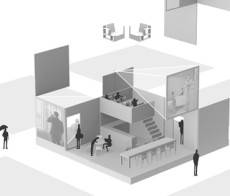September 27, 2013
What’s wrong with adopting a more positive approach to work and workplaces?
[embedplusvideo height=”160″ width=”220″ standard=”https://www.youtube.com/v/u6XAPnuFjJc?fs=1″ vars=”ytid=u6XAPnuFjJc&width=220&height=160&start=&stop=&rs=w&hd=0&autoplay=0&react=1&chapters=&notes=” id=”ep2086″ /]
Has there ever been a UK government more interested in the workplace than this one? Most of it has been about cutting costs of course, so the majority of announcements emanating from the Cabinet Office have been about procurement, design and environmental performance. David Cameron even at one point announced that he wanted to measure people’s happiness. The questions needed to work out how happy we are proposed by the Office for National Statistics as a result would have had a very familiar feel for anybody who has ever completed a workplace satisfaction survey even if they miss the most blindingly obvious point that when you’re skint and in mortal fear of losing your job, most other things about work lose their lustre.

























September 30, 2013
Don’t let the sofas fool you; work can still be red in tooth and claw
by Twyla Howse • Comment, Flexible working, Furniture
Herbert James Draper: Ulysses and the sirens
We keep filling our workplaces with sofas, coffee shops and other lifestyle touches while our homes are being slowly eroded by the trappings of work. First it was the fax machine. Then the mobile phone. Then working from home. The places available for us to work is seemingly more diverse than ever. But does this acknowledged trend towards domesticity make the workplace a kinder, gentler place? Maybe on the surface but beware to those who dare succumb to the siren song of these things. Using them could mean the end of your career.A recent conversation I had with an executive highlighted the problems inherent in the mixed messages this “softening” of the work environment brings.
(more…)